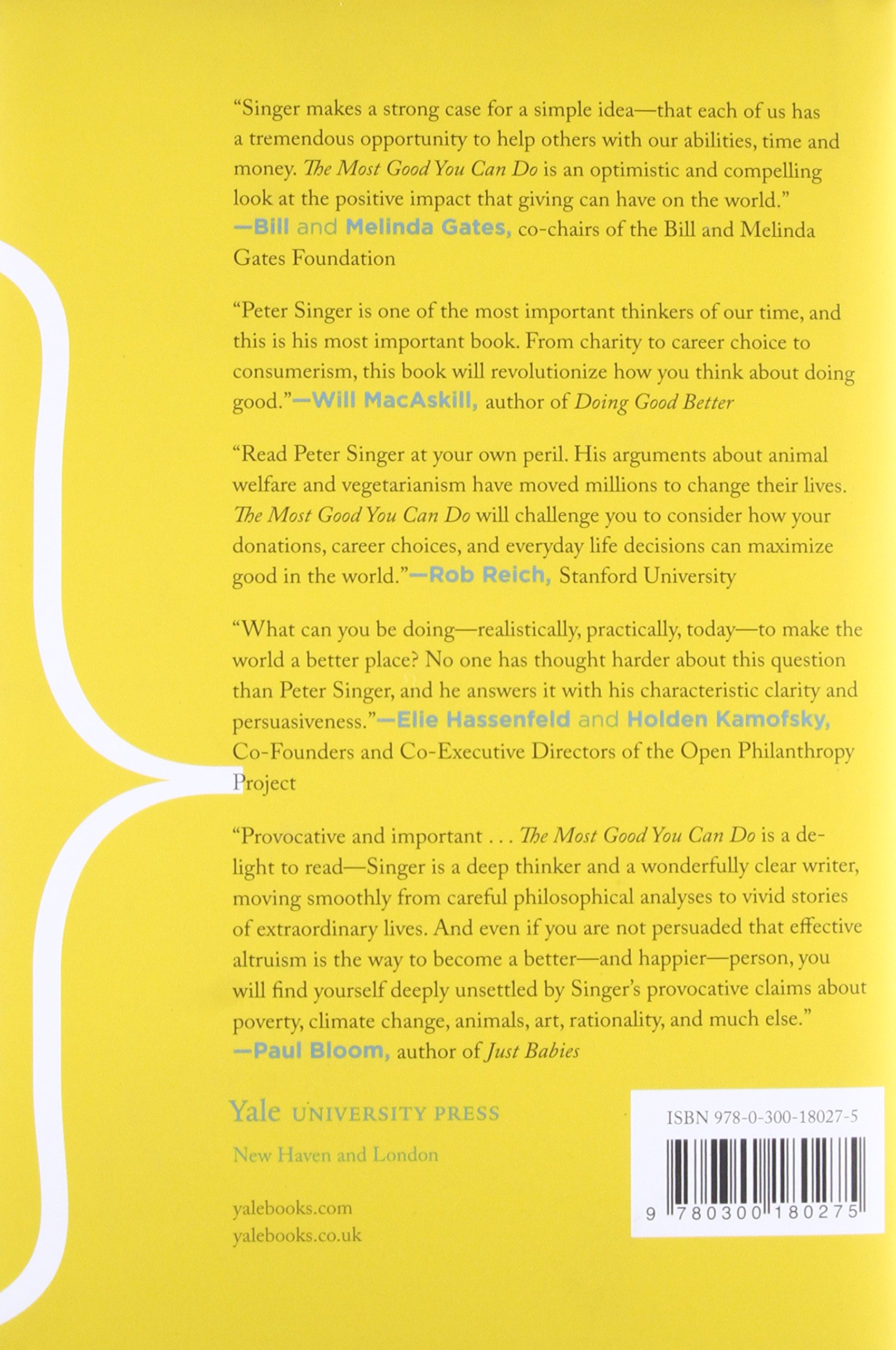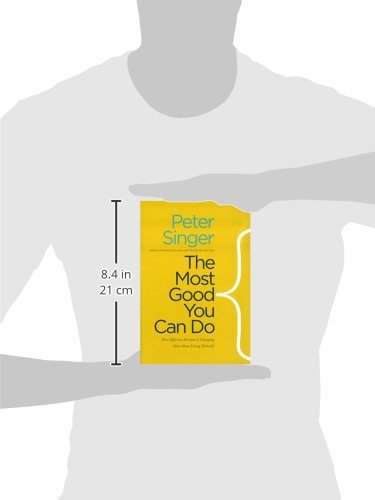



Full description not available
B**N
Life-changing
Seven years ago, Professor Singer came to my high school to give a talk about his previous book, The Life You Can Save. He exhorted me and my classmates to give to charities across the world as readily as we would leap into a pond to save a drowning child nearby. Of course I decided he was crazy and had no idea what he was talking about. (After all, if he really believed what he was saying, surely he'd live in a cardboard box so that he could donate more money to Oxfam! But he didn't, and he even told other people not to either.)Still, I couldn't get his arguments out of my head. They were a little scary, and yet compelling. What if I really could save so many lives simply by donating money that I had no real need for anyway? I should be lucky to have the chance!Seven years on, after mulling it over a lot, I've largely come around to Singer's point of view. I'm excited by the huge amount of impact I'm able to make simply by the luck of being born in a first-world country. I think of the idea of effective altruism as a challenge to rise to, not a burden to bear.Meanwhile, the effective altruism movement has matured and grown a thousandfold, and Professor Singer has wonderfully distilled its essence into a new book, The Most Good You Can Do. He still doesn't recommend living in a cardboard box--you can read why for yourself in chapter 3--but he does present a wealth of other knowledge about how to do a huge amount of good in the world.For readers new to effective altruism, here are my favorite chapters:- Chapter 3, in which Prof. Singer describes principally how one couple lives fully and happily on a small fraction over income, and donates over 50% to charity.- Chapter 5, which describes a lot of other people who have done incredible amounts of good with their careers.- Chapter 9, on the surprising fact that these people, who give away so much, do not seem to feel that it's a burden, but rather, that it makes them happier and more fulfilled.- Chapters 10, 11, and 14, on how to find the charities and causes that will do the most good with your donation. (Including one of my favorite thought experiments, the "demon-haunted art museum." Prof. Singer really has a knack for thought experiments!)Overall, the book was very readable--unlike most philosophers, Prof. Singer writes simply, lucidly and to-the-point. It's also fairly short, clocking in at about 175 smallish pages. But The Most Good You Can Do punches well above its weight; you'll find every page interesting and thought-provoking. Happy reading! You're in for a treat.
A**R
An excellent introduction
Disclosure: I give about 15% of my income to some of the charities discussed in this book, and I plan to give that much or more for the foreseeable future. I read The Most Good You Can Do as a committed effective altruist.Even if I hadn't, though, I think I'd have found this book compelling. The first ten or so chapters are uniformly excellent: My favorite pages were those telling the stories of dozens of people (from tech CEOs to low-income graduate students) who live extraordinarily generous lives. Singer also gives a more fluid introduction to the concepts behind effective altruism than you'd find by just reading blog posts or newspaper articles written by a variety of authors. He uses very little technical philosophy and a lot of plain language -- I finished the book in a couple of hours, and enjoyed every minute.Why only four stars? Near the end of the book, Singer begins to explore some of the in-depth causes that certain effective altruists support. These chapters were interesting to me, but they're also filled with numbers and speculative calculation and feel "colder" than the rest of the book -- they won't appeal to everyone. Still, this is an excellent book overall, and I'd recommend it to effective altruists and non-EAs alike.(If you've never heard of effective altruism, you may want to watch Peter Singer's TED talk on the subject before buying this book. The TED talk is free, it takes fifteen minutes to watch, and it's changed the lives of many people I know.)
C**S
Concrete ways to give life a meaningful ethical focus, and a new social movement of rational do-gooders
Singer has long argued that living an ethical life means respecting the fact that others' suffering matters as much as our own, which in turn means that limited resources should be directed to those whose suffering can be reduced most efficiently. In this book, he describes a new generation of philosophers, economists, and analysts whose work is making the outcomes of charity spending understandable to a wider audience (showing that many charities can show evidence for effectiveness, but quite many can't) and showing how certain well-considered uses of our life's work and financial resources can reliably do far more good than even the most selfless people will usually achieve.As more people learn about these ideas, an international movement is building of "effective altruists": people who recognize not only that a life spent helping others is more satisfying than one spent seeking comfort and luxury, but also that we should help others as much as possible through efficiency and reasoning, instead of just focusing on helping others in ways that are emotionally compelling. One of the most innovative and controversial of these methods is "earning to give"-- the strategy (now being followed by some in the finance sector) of focusing on maximizing one's earnings entirely for the purpose of funding high-impact work being done by others.The book also applies an empirical/consequence-driven perspective to address issues like how humans impact the environment and inflict suffering on animals on an immense scale. It follows the logic of maximizing impact into some more speculative areas as well, like the question of whether we're currently in a position to affect the chances of eventual human extinction.As usual, Singer's writing is clear, forceful, and illuminating. His utilitarian ethical framework provides a means of comparing different kinds of good or bad outcomes in interesting ways. (For example: is it better to save the lives of a number of people, or cure nonfatal illnesses for a great many more people? For effective altruists, it's a real choice to be made.)This book has the potential to reshape lives. Most of us want to do good in the world, and Singer provides a powerful framework for making good decisions about how to do it.
Q**A
Faça jus ao "humano" de ser humano
Leitura obrigatória para qualquer pessoa que se inquieta com injustiças e gostaria de ajudar o mundo a ser um lugar melhor. Peter Singer em grande forma.
E**E
I recommend
Good quality. Fast delivery. The book is informative and well written. This is basically the ultimate guide to effective altruism. After reading this, go to Givewell.com and take a look at the FAQ, you’ll see that you already know all the answers !
M**.
Gran ensayo
Éste es un ensayo que merece la pena leer y reflexionar. Un escritor excelente capaz de exponer ideas tan complejas como el altruismo y el uso del mismo de una forma realmente didáctica. Es evidente desde la primera página que el autor es un maestro del pensamiento y la palabra. Mi visión del altruismo ha cambiado y para mejor. Una lección que merece estar en nuestras estanterías.
S**H
A good read. Inspiring read.
Many interesting ideas compacted into very few pages. At first, I was interested in the Alumni, then realising his success, reading this made me think more about what I have done thus far. The book truly inspires me to continue my journey to being a more effective altruist.The book came in good condition, packaging was good and safe. Prime gave very fast delivery.
D**E
An excellent introduction to the interesting world of effective altruists and ...
An excellent introduction to the interesting world of effective altruists and how their emphasis on 'doing the most good' helps to reduce suffering of people who need our help. I also highly recommend his other book, The Life You Can Save.
Trustpilot
5 days ago
1 week ago